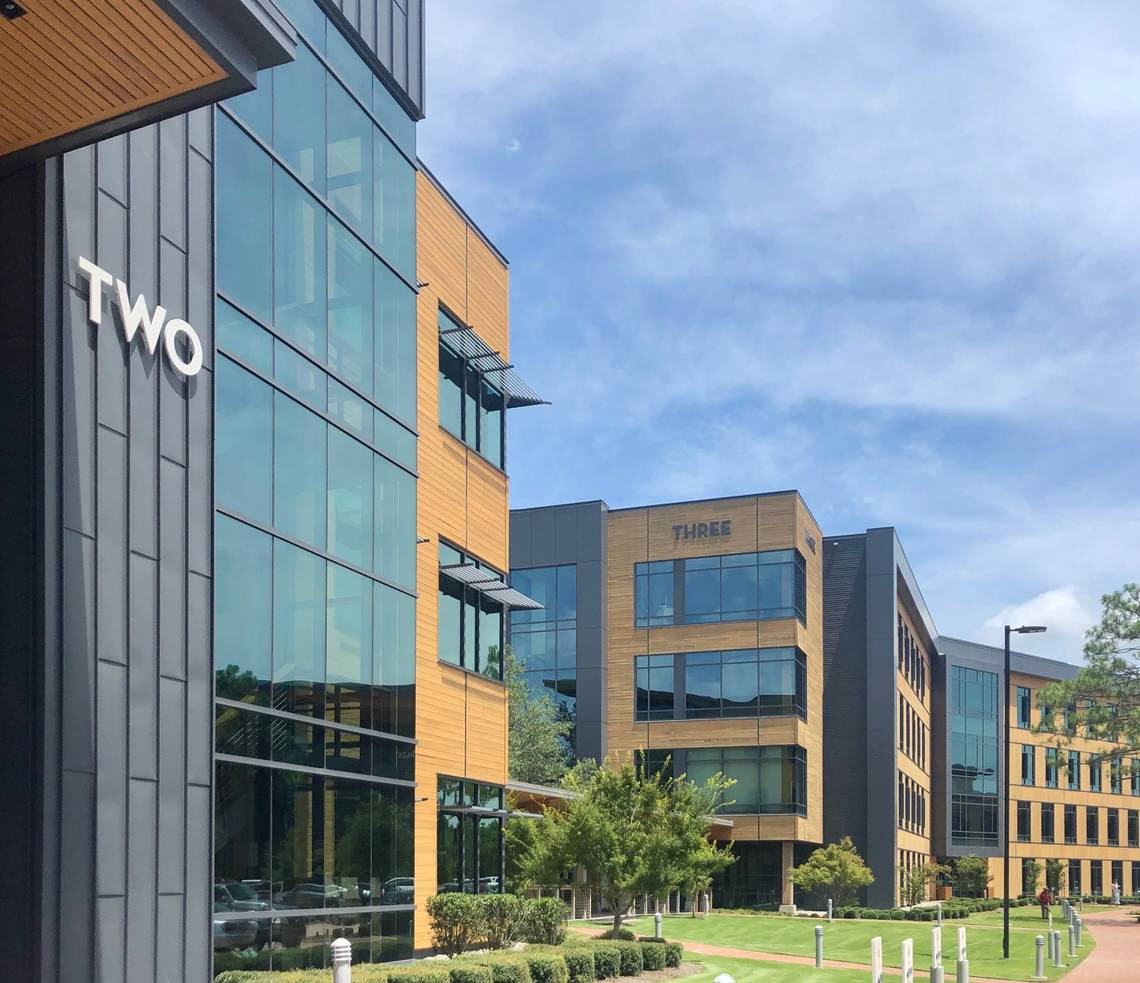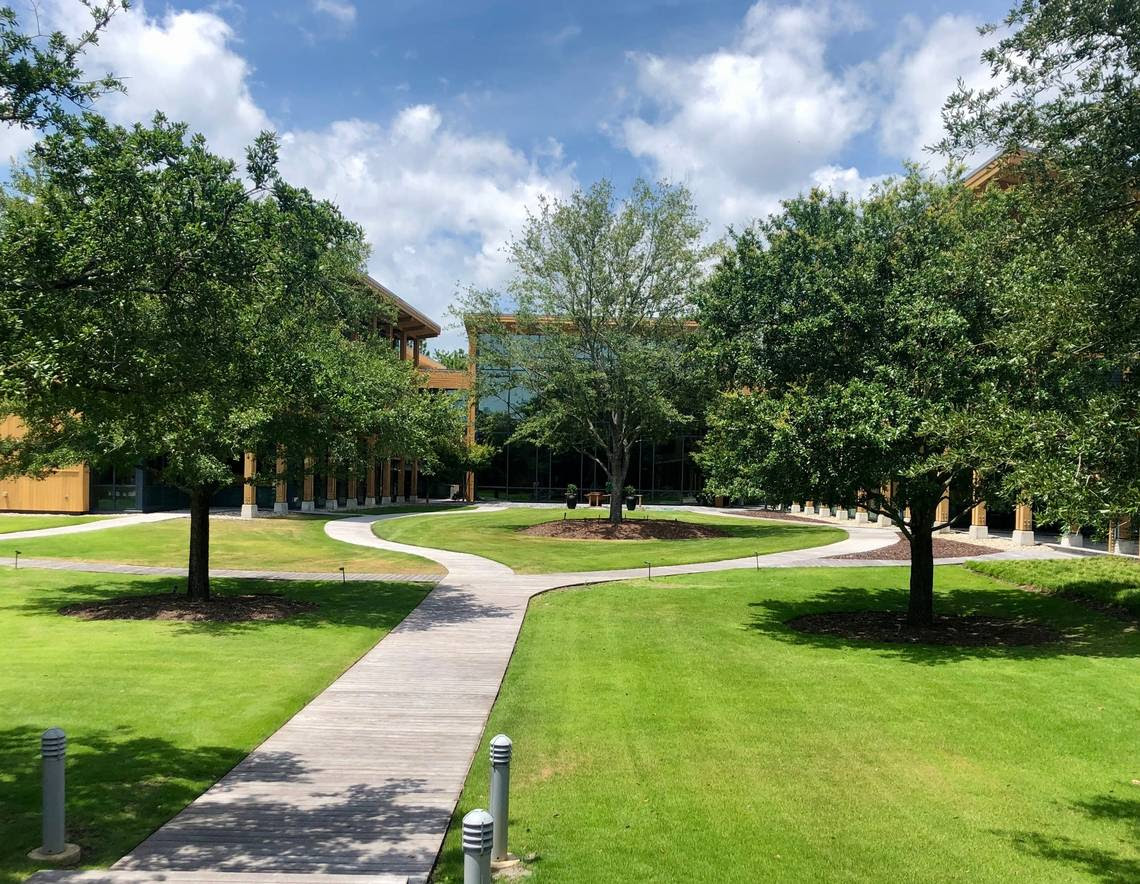Chip Mahan (9/2020) news

Sept. 2020
One of the nation’s most influential bankers is turning Wilmington into a tech hub
WILMINGTON
A decade ago, nobody thought of Wilmington as a banking or technology hub. At that point, North Carolina’s largest coastal city was mostly known for tourism and a declining film industry.
And while it is still not a national hub, bankers and investors from across the country now look to Wilmington to see where the future of banking technology might be going.
The reason: a charismatic Kentuckian named James “Chip” Mahan.
Mahan has created a group of companies that are shaking up the way banks do business. The Mahan family tree, most with roots in Live Oak Bank, now employs more than 1,000 people in Wilmington. The bank’s tech arm, Live Oak Labs, recently added a satellite campus on N.C. State University’s Centennial Campus in Raleigh.
In July, the bank’s first technology spin out, nCino, went public on the Nasdaq stock exchange. Its shares started the day at $31. By day’s end, they were selling for $91, and the company had a market value of $7 billion.
Another new technology offshoot, Apiture, just raised $20 million from investors.
And Mahan himself raised more than $500 million for a venture-capital firm he cofounded to invest in fintech startups — companies whose aim is to create financial technology that will replace the banking industry’s legacy infrastructure. Thirty-five banks invested in the firm, called Canapi Ventures, including many regional banks that hope to benefit from Mahan’s vision.
And he’s not about to stop. “We are still in the early innings here,” Mahan said in an interview with The News & Observer.

In the past 10 years, Live Oak Bank’s campus in Wilmington has grown to multiple buildings. (Zachery Eanes | zeanes@newsobserver.com)
His recent successes make him look like an oracle, but Mahan — who at 68 shows no signs of slowing down — has been starting and investing in promising financial technology ventures for decades. He is credited with creating the first internet-based bank during the 1990s.
“If you are an investor in the fintech space and you don’t know Chip, you are behind the curve,” said Shawn Munday, a finance professor at UNC’s Kenan-Flagler School of Business.
Mahan speaks with a Kentucky drawl and has a crop of receding, snow-white hair. Wearing a blue fishing shirt with large breast pockets instead of a banker suit in his Wilmington office one day this summer, Mahan comes across as laid back and relaxed. The large windows in his office overlook a man-made lake that he had installed on the bank’s growing, private campus.
And while he may look like he’s ready to hit the intracoastal waterway after the day’s meetings, Mahan wears his ambition on his sleeve.
“This is more than a bank,” he told a visitor. “These investments that we have made have to do with changing the entire infrastructure of this industry.”
A return to NC
Mahan moved to Wilmington from Atlanta in the early 2000s. His wife, Peggy — they’ve known each other since they were 11 years old — had been diagnosed with breast cancer. Mahan quit his job running S1, a financial software company, to take care of her. The Mahans had decided to seek treatment at Duke University’s highly rated cancer institute.
Had Wilmington not been within a couple hour’s drive of Durham, the move would not have happened.
It was a return of sorts to North Carolina.

Originally from Kentucky, Chip Mahan moved to Wilmington in the mid-2000s, after his wife was diagnosed with cancer. The couple wanted to be closer to Duke University, where she was being treated. (Live Oak Bank)
Mahan grew up working on his grandfather’s farm in Kentucky. He spent his 20s working in Winston-Salem at Wachovia Bank, after graduating from Washington and Lee University. Whenever he went on vacation, which in those days was rarely, he drove to a friend’s place out on Wrightsville Beach.
It started a love for the Carolina coast that stuck. His wife fully recovered from cancer, and Wilmington became home.
Let’s put a bank on the internet
Until the 1990s, Mahan was more of a traditional banker, running a bank in Lexington, Kentucky. A conversation with his then brother-in-law, the owner of a nascent software development company in Atlanta, changed his trajectory.
“We were sitting around the dinner table one night in 1993, and he said, ‘This internet’s gonna be a big deal,’” Mahan recalled. “Of course, I didn’t know what the hell the internet was.
“But I said, ‘Let’s try to put a bank on the internet.’”
When Mahan gets an idea, he has to act on it. Sometimes the idea doesn’t end in success, but he has to give it a go.
“I can’t live with myself if we don’t try this,” Mahan said on a podcast in 2018. “People that are like us never, ever think of failure. It is just a temporary setback.”
Live oaks dot Live Oak Bank’s campus in Wilmington, N.C. (Zachery Eanes | zeanes@newsobserver.com)
So, in a pattern that has repeated itself since, Mahan said, he started hiring a bunch of engineers “to write code and create a bank on the internet.” The bank was called Security First, and it never truly got off the ground. The internet was still too young. Mahan sold the banking operations to the Royal Bank of Canada in 1998 for $20 million, American Banker reported.
But the tech side of the business, which had been spun out as that company called S1, was thriving as the internet began to go mainstream. Banks like JP Morgan became customers, and, at one point, the company had a market cap of $4 billion.
Then came his wife’s cancer diagnosis and the move to Wilmington.
After Peggy recovered, Mahan didn’t take to being out of work. In 2008, he opened Live Oak Bank. The idea: make Small Business Administration loans, which are partially guaranteed by the government, to the entrepreneurs least likely to default. He had seen how other banks had profited from the loans, but saw that it was still a regional game. What if you could do it on a national level? he wondered.
After combing through reams of data, Mahan determined that veterinarians, pharmacists and funeral directors were the entrepreneurs least likely to default on SBA loans. They became the bank’s first customers.
The idea worked. Live Oak Bank is now the biggest SBA lender in the country and lends to a wide variety of industries.
To the cloud
How did this small, new bank reach a national audience? That’s where nCino came in. Live Oak created software that would automate and simplify the complex task of originating a loan, a process that involved a large amount of data and multiple parties. Those complexities had been a recurring problem at S1, and this time Mahan was adamant about finding a way to put all of that data and paperwork in one box.
The nCino cloud-based software did that, allowing Live Oak to go national without a national physical presence. Before most banks began to de-emphasize their physical branches, Live Oak was growing without them.
“In 2010, nobody wanted to touch the cloud. But we did,” Mahan said. When it became evident that this new Live Oak software could be used industrywide, Mahan separated it from the bank and hired Pierre Naudé, a former colleague at S1, to run it.
While nCino is still losing money, it is growing fast. It has signed up hundreds of customers, expanded globally andposted revenues of $138.2 million in its 2020 fiscal year, a 138% increase from two years ago. Before going public, nCino was one of just five startups in the state valued at more than $1 billion.
Live Oak Bank’s influence can even be seen in the name of its successful technology spinout, nCino. Encino is Spanish for oak. (Zachery Eanes | zeanes@newsobserver.com)
“It’s definitely groundbreaking,” said Peter Gwaltney, president of the NC Bankers Association. “(It’s) made it possible to do business on a national scale from a single office in Wilmington.”
The sudden growth of nCino and Live Oak has made the city potentially fertile ground for more fintech advances. “(nCino) gave us really early knowledge of these cloud-based platforms,” Mahan said.
The company has now incubated or invested in a variety of young, up-and-coming companies. Beyond nCino and Apiture, Live Oak has investments in other cloud-based banking startups, like the cybersecurity firm DefenseStorm, payment processor Payrailz and banking software maker Finxact.
Mahan said he expects to continue to invest in and seed more of these startups.
Growth in Wilmington
The Live Oak campus is tucked away from the public’s eye off Independence Boulevard, one of the main arteries through Wilmington. If you didn’t know to look for it, you’d never notice it. But once you make it beyond the tree line, you’ll find a sprawling campus that is still growing. Three new buildings stand on the site and more are planned.
There’s a man-made lake, a grove of live oak trees, of course, and buildings crafted out of large panes of glass and beams of locally sourced cypress. “Cypress was the perfect solution,” Wilmington architect Laura Miller told Architect Magazine, “not only due to its local availability, but also its natural durability and beautiful aesthetic qualities.”
“It looks like something you’d see in Silicon Valley,” said Wilmington Mayor Bill Saffo.
That’s sort of the point, Mahan said.
Live Oak Bank, which has no physical branches, has become the largest SBA lender in the country. (Live Oak Bank)
You have to spoil employees to get them to stay, or to get them to leave New York, California, or even Raleigh. The company pays competitively, offers free health insurance and runs three private jets around the country constantly to make sure employees can get home to Wilmington quickly on trips. There’s a 25,000-square-foot fitness center, where every employee can meet with a private trainer.
In July, the campus was about 75% empty because of COVID-19. Mahan is adamant, though, that “all of this matters.” Offices, he said, will be just as important after the pandemic is gone.
Natalie English, president and CEO of the Wilmington Chamber of Commerce, said Mahan’s move to Wilmington was one of the best things that has ever happened to this region.
“The impact ... it’s kind of hard to quantity because it has happened so quickly,” she said in an interview. “The growth in the number of jobs in the fintech industry in the past three years is impressive. We are in the thousands of jobs that are directly related to nCino, Live Oak and Apiture.”
Live Oak employs hundreds of UNC-Wilmington graduates, and is helping the city retain young talent, something it has struggled with in the past. Saffo said the company routinely invests money back into the community. Earlier this month, Live Oak said it would invest in a business incubator in downtown Wilmington to help small businesses and provide finance training for individuals.
Chris Babcock, the CEO of Live Oak’s most recent incubated company, Apiture, is one of those recent recruits to Wilmington. Like Naudé at nCino, Babcock moved to Wilmington from Atlanta and used to work at S1. He said while the city has a great quality of life, Mahan is one of the draws for people moving here.
“You know, he’s an inspiring and charismatic guy,” Babcock said. “He’s got tons of knowledge in the industry. He’s really big on building relationships, and, you know, he keeps his word.”
What’s next
Mahan believes Apiture could have as much potential as nCino. In the couple of years since it was formed, Apiture already has more than 200 employees tucked into Building Three on Live Oak’s campus. In July, it raised $20 million from investors.
Like nCino, Apiture focuses on the cloud solutions to legacy banking software. The company has partnered with Finxact to create an alternative to the core software that banks use to process deposits, loans and most of the transactions that take place across banks.
This service is currently dominated by three companies — Fiserv, FIS and Jack Henry — and in some cases, banks are using decades-old software to power their services. But the explosion of mobile banking has put a strain on these legacy providers. Many of the country’s largest banks are throwing billions of dollars at improving these underlying infrastructures to keep pace with technological changes, Mahan said.
But smaller banks can’t afford to do that, which is where Apiture — and more broadly Canapi Ventures — comes in. Apiture allows banks to be more flexible in how they design their online banking platforms.
“It could be a massive market disruptor to that oligopoly,” said Munday, the Kenan-Flagler professor. “I worked at Citigroup for many, many years — I can tell you … the biggest single issue was technology infrastructure. It was billions of dollars and thousands of man hours just to make incremental changes to those infrastructure systems.”
Mahan is developing a cloud-based solution that all regional banks could use, Munday said.
Mahan thinks that market could be worth billions, and he’s not done searching for what comes next in digital banking.
“The 280 billion lines of code that run the engine of financial services in the United States of America will be replaced,” he said. “I can’t tell you how long it’s going to take, and I can’t tell you exactly which companies are going to be the winners, but it is going to happen.”
This story was produced with financial support from a coalition of partners led by Innovate Raleigh as part of an independent journalism fellowship program. The N&O maintains full editorial control of the work. Learn more; go to bit.ly/newsinnovate





